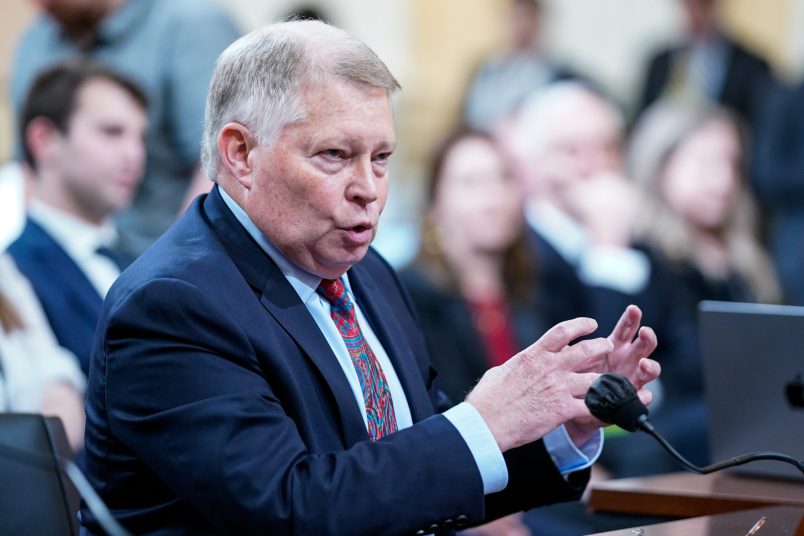As the Supreme Court starts hearing oral arguments for their fall term, legal experts have been sounding the alarm about Moore v. Harper, the redistricting case out of North Carolina that, depending on how justices rule, could substantially alter the future of American democracy. The case offers a dramatic reimagining of election powers at the state and federal level.
The once-obscure legal doctrine at the heart of the case, the independent state legislature theory, is rooted in a reading of the Constitution that hands governing authority over elections entirely to the state legislature, boxing out state courts’ power for checks and balances.
Among those warning about the ramifications of a SCOTUS ruling that bolsters the theory is former federal appellate judge J. Michael Luttig, who has repeatedly broken with his conservative colleagues in recent months to warn about how conservative justices might rule on the case. Earlier this year, Justices Clarence Thomas, Samuel Alito, Brett Kavanaugh and Neil Gorsuch suggested in a dissent that it might be time for the high court to visit theory.
On Monday, Luttig published an op-ed in The Atlantic picking it apart. The independent state legislature theory rests in the belief that the Elections and Electors Clauses in the U.S. Constitution give state legislatures exclusive jurisdiction to draw congressional maps, change election rules, and appoint their own electors without interference from state courts.
The Elections Clause states:
“The Times, Places and Manner of holding Elections for Senators and Representatives, shall be prescribed in each State by the Legislature thereof; but the Congress may at any time by Law make or alter such Regulations, except as to the Places of chusing [sic] Senators.”
The theory came into vogue among conservatives only recently, making brief appearances in 2000 and 2015 before North Carolina’s Republican-led state legislature brought Moore v. Harper to the Supreme Court in an attempt to defend their heavily-gerrymandered new congressional maps.
Luttig, a renowned jurist who was appointed to serve in the U.S. Court of Appeals by former President George H.W. Bush, argues in his piece that there’s no constitutional basis for the theory, and suggest that validating it could disrupt the democratic process for years to come.
“If the Court concludes that there is such a doctrine,” he writes, “it would confer on state legislatures plenary, exclusive, and judicially unreviewable power to both redraw congressional districts for federal elections and to appoint state electors who quadrennially cast the votes for president and vice president on behalf of the voters of the states.”
Luttig also argues that the Framers wrote the Constitution specifically to enable Congress to reinforce the authority of state supreme courts, rather than circumvent it.
“Specific to the historical record of state judicial review, the Framers wrote the elections clause against the backdrop that most state constitutions at the time constrained their respective legislatures when they regulated both state and federal elections,” he writes.
“If there where authority in the Constitution to limit the state supreme courts in their exercise of the states’ judicial power, that authority would be found in the elections clause,” he writes, “because when the state legislatures prescribe the manner for holding federal elections, they do exercise federal constitutional power granted to them in that clause.” But, he explains, there is no evidence ruling out state judicial review of a legislature’s redistricting decisions to be found.
He lamented over why the Supreme Court would take the case up in the first place.
“There is no reason to believe that there would or should be any agreement among the justices as to how to fashion federal constitutional constraints on the state supreme courts’ review of their legislatures’ laws under their own respective state constitution,” he writes. “But there is every reason that they should never try.”







John Roberts might just flee up his own craven asshole.
They took the case because they are a bunch of partisan hacks that will do whatever it takes to benefit the Republican party, as we have seen Alito do today.
If the illegitimate, corrupt Republican Supes didn’t constantly demonstrate bad faith, I wouldn’t even know they had any faith at all.
SCOTUS to the state supreme courts: “Our decisions are sacred law. Your decisions are bupkis.”
I’m not entirely sure how that’s accomplished, but I’m up for letting him try.